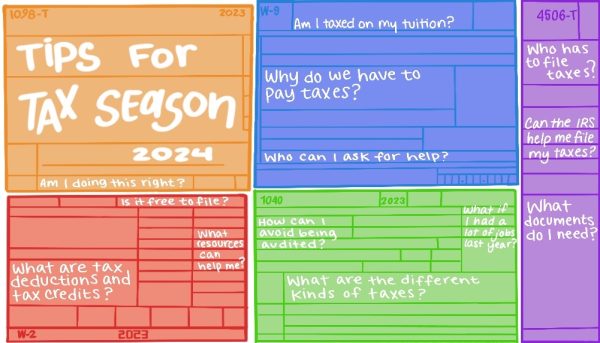Providing some peace of mind for first time tax filers
Charlie Trumbull
Contributor

There can be a lot of questions when it comes to filing taxes, but figuring it all out doesn’t have to be difficult. Illustration by Charlie Trumbull
It’s tax time. While many students may find the filing process confusing, it doesn’t have to be. Here are some answers to all your tax questions.
Why do we pay?
Taxes fund everyday things we may all take for granted. Without taxes there would be no public transportation, hospitals, schools, or emergency services.
What are the types of taxes?
There are many different kinds of taxes, but the four main ones we deal with are income, sales, and property taxes. Income tax is placed on money earned through employment and investments and is calculated based on how much money you earn. Different tax rates apply based on your income level, as well as many deductions and credits. Sales tax is already calculated and added onto the price of goods and services when purchased. Property tax is calculated based on the assessed value of your home, vehicles, or anything else you own. Typically, this value is set by your local government and the tax represents a percentage of what your property is worth.
Who has to file?
Almost everyone has to file their taxes, but there are a few exemptions based on an income threshold set by the Internal Revenue Service (IRS). If you are unmarried and under the age of 65 and made under $12,950 in 2023, you do not have to file. The same goes for those who are under 65, married and filing jointly if they made under $25,900. The amount depends on age, marriage status, and parental status. It is important to know if you need to report your income or not. However, the IRS suggests that some taxpayers should consider filing even if they aren’t required to if they qualify to claim tax deductions or credits.
What are deductions and credits?
Tax deductions are factors which can reduce the amount of taxable income, whereas credits can reduce the amount of tax due. Both can either lower your tax bill or increase your refund. There is a plethora of these waiting to be used to your benefit. According to Nerdwallet, a financial advising company, the most popular tax breaks for students this year are the Lifetime Learning Credit which can save you money if you paid your tuition and school fees and the Student Loan Interest Deduction for those who have paid interest on their student loans. There is an insane amount of deductions and credits available for all kinds of things, so be sure to find the ones you qualify for by searching “credits and deductions for individuals” at irs.gov.
What documents do I need?
- W-2: Each person’s taxes are unique to them, but there are basic documents that everyone needs for filing. Your employer will give you a W-2 which lists all your income from the time you worked for them. It also itemizes the important information about the amount of taxes your employer withheld and benefits they provided.
- 1099: Additionally, rideshare, food delivery, and freelance work is growing more common each day. If you worked for any kind of gig like Uber, DoorDash, GrubHub, etc. you will be provided with a 1099 form which lists the wages you made. With this information, you will be able to report your gig income. Be sure while you’re working to keep track of how many miles you’ve driven, supplies you purchased, and all gas receipts as these can be useful when calculating deductible income.
- 1098-T: This document is provided by WCC and shows your payments and other reportable transactions with the school. You can reach out to someone at the WCC FInancial Aid Department to see Student Tax Information on their website which covers credits and deductions, FAFSA filing help and extra resources for international students. Their office is located on the second floor of the student center and they can be reached at 734-973-7703 or billing@wccnet.edu.
Who can I ask for help?
Asking a tax professional for help understanding this process is beneficial but can sometimes become costly. IRS.gov is a great resource for guidance. In the last few years the IRS has modernized their website to become easier to navigate and understand. They offer a ton of free resources and assistance like their Interactive Tax Assistant and a list of 8 trusted partners who offer free filing services. The Find Your Trusted Partner(s) Tool is a reliable way to find free services supported by the government. More free or affordable services can be found at Intuit TurboTax which offers a free edition for anyone who qualifies, and H&R Block Online and TaxAct are commonly used.
Suggestions:
TurboTax Preparation Checklist

